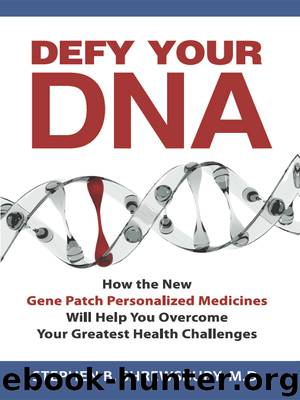Defy Your DNA by Stephen Shrewsbury

Author:Stephen Shrewsbury
Language: eng
Format: epub, mobi
Publisher: 10 Finger Press
Chapter Seven
The Big Ones: Common, Chronic Diseases
Chronic and common diseases such as asthma, cancer and heart disease are scourges of modern life. Pharmacy shelves are filled with blockbuster drugs aimed at controlling the symptoms of these diseases. But, none of these drugs address the actual cause of these conditions. And, many come with significant side effects. Oligomers can target the root cause of disease, the message that each cell transmits from its genes to the protein-making machinery. By doing so they will prevent the disease from manifesting without harming you.
There are exciting developments in personalized medicine for treating breast, prostate and lung cancers, and leukemia. Taken together, these ailments claimed the lives of 666,970 Americans in 2011.
Genetics plays a part in a significant percentage of these diseases, and many of the responsible genes may be amenable to oligomer therapy. For example:
• There are approximately seventy genes listed on the Leukemia Gene Database related to twenty different leukemias.
• Most of the five to ten percent of breast and ovarian cancers that are believed to be inherited are linked to the well known BRCA1 and BRCA2 genes.
• In January of 2012, genes were identified for both prostate and lung cancer.
Oligomers also hold promise for the development of therapies for other common diseases such as asthma, high cholesterol, and arthritis. You’re about to discover how oligomers can address some of the most prevalent diseases that either you, or someone you know may suffer from now or in the future.
On June 26, 2000, the first Human Genome was sequenced. President Bill Clinton truly recognized how momentous this event was “ …this is the most important, most wondrous map ever produced by humankind,” he said. “With this profound new knowledge, humankind is on the verge of gaining immense new power to heal. Genome science will have a real impact on ALL our lives, and even more, on the lives of our children. It will revolutionize the diagnosis, prevention, and treatment of most, if not all, human disease.”
He was right. Nothing he said was an exaggeration. Here’s why:
We appear to be close to exhausting the potential supply of (small molecule) drugs for all the potential targets of the “druggable” genome. We are also struggling to keep ahead of bacterial resistance and have had lamentable lack of success treating virus infections. So where are the next generation of therapies in medicine going to come from? And, just as important, can they tackle anything more than the rare genetic diseases or the lethal killer viruses which have by and large stayed away from the Northern Hemisphere’s shores?
From the moment in 1978 when Harvard professor Paul Zamecnik performed his experiment with an oligonucleotide to demonstrate a blocking effect that was predictable, tremendous advances in research on how and when to manipulate RNA have been taking place. Over the same period, especially the last decade, there has been a worrying slump in the number of new (small molecule) drugs receiving approval. In addition those that have been approved have had to struggle with the rapid, dramatic and inexorable increase in development cost and time.
Download
This site does not store any files on its server. We only index and link to content provided by other sites. Please contact the content providers to delete copyright contents if any and email us, we'll remove relevant links or contents immediately.
| Fossils | Game Theory |
| Genetics | Molecular Biology |
| Organic | Paleontology |
Sapiens: A Brief History of Humankind by Yuval Noah Harari(14389)
Sapiens by Yuval Noah Harari(5371)
Pale Blue Dot by Carl Sagan(5008)
Homo Deus: A Brief History of Tomorrow by Yuval Noah Harari(4918)
Livewired by David Eagleman(3775)
Origin Story: A Big History of Everything by David Christian(3692)
Brief Answers to the Big Questions by Stephen Hawking(3435)
Inferior by Angela Saini(3316)
Origin Story by David Christian(3202)
Signature in the Cell: DNA and the Evidence for Intelligent Design by Stephen C. Meyer(3138)
The Gene: An Intimate History by Siddhartha Mukherjee(3098)
The Evolution of Beauty by Richard O. Prum(2997)
Aliens by Jim Al-Khalili(2830)
How The Mind Works by Steven Pinker(2816)
A Short History of Nearly Everything by Bryson Bill(2698)
Sex at Dawn: The Prehistoric Origins of Modern Sexuality by Ryan Christopher(2529)
From Bacteria to Bach and Back by Daniel C. Dennett(2485)
Endless Forms Most Beautiful by Sean B. Carroll(2483)
Who We Are and How We Got Here by David Reich(2437)
